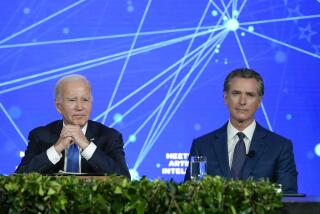Scientifically Speaking, We’re No. 1 : California’s dominance of the federal science Establishment offers a lesson for hard times
Californians often gripe about a perceived East Coast bias in the national news media, in Washington government circles, in national arts organizations, in television prime-time programming. Whether or not those complaints are warranted, the same certainly cannot be said about science, technology and medicine. Californians fairly dominate the Washington science Establishment, and therein lies an important lesson for the future of this economically struggling region.
The new president of the National Academy of Sciences, the influential quasi-official organization that advises government on scientific, engineering and medical issues, is Bruce M. Alberts. He was a professor of biochemistry and biophysics at UC San Francisco. The new administrator of the National Aeronautics and Space Administration is Daniel S. Goldin, formerly vice president and general manager of the TRW Space & Technology Group in Redondo Beach.
The list goes on: At the White House, the associate director for science in the Office of Science and Technology Policy is M. R. C. Greenwood, a biologist who was dean of graduate studies at UC Davis. Dr. Harold E. Varmus, a virologist who was a professor at UC San Francisco, is director of the nation’s main financial backer of basic research, the National Institutes of Health.
The president of the Institute of Medicine, an arm of the academy of sciences, is Dr. Kenneth I. Shine, a cardiologist and physiologist who is immediate past dean and provost for medical sciences at the UCLA School of Medicine. Francisco J. Ayala, a biologist at UC Irvine, is the new president of the American Assn. for the Advancement of Science, the nation’s largest scientific organization. And the association’s influential journal, Science, is edited by Daniel E. Koshland Jr., a biochemist who taught at UC Berkeley.
We mention all this not out of regional parochialism. Rather the message is that, for all its national and self-made image as a land of movie fantasy, escape and golden surfers, California has a strong intellectual tradition, particularly in the sciences. Institutions like Caltech, Stanford and the UC system, as well as major defense and space contractors like TRW, long have been the source of national leadership.
All benefited from Cold War spending on science and technology, and all have suffered financially with its end. But as we plot the post-Cold War era for the new California we must not neglect this important resource.






